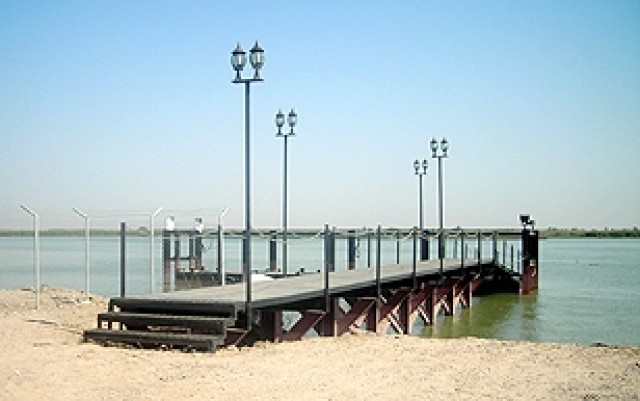AN NASIRIYAH, Iraq, Nov. 30, 2006 - The completion of a port security facility on Iraq's southern waterways comes as another tick in the U.S.-led Iraq reconstruction effort's border security campaign, but its effects will be far-reaching in a country where constantly evolving interdependencies dictate the pace and efficacy of political, security and economic development initiatives.
In October, the U.S. Army Corps of Engineers turned over a newly constructed operations and administration center to Iraqi law enforcement agencies working on the Al-Faw peninsula, tasked with securing the Sha'at al-Arab waterway - Iraq's only direct egress to the Persian Gulf. The ports in the region are crucial to ensuring Iraq's economy viability as a large percentage of the country's oil exports go through the Khor al-Amaya and Mina al-Bakr tanker terminals.
More than 150 border forts and outposts have been constructed and turned over to the Iraqi security forces around the country, a majority of them clustered along the borders with Iran and Syria. As the ISF and Coalition forces fight to halt the influx of foreign fighters, weapons and supplies into Iraq, the border security facilities have become a front line for reducing violence deeper inside the country.
Border security forces have also engaged the criminal element operating in Iraq, cutting into a thriving black market that has severely impeded economic reforms and undermined the Iraqi government's programs to stabilize prices and supply of critical items.
Russell Holeman, chief of engineering and construction for USACE's Gulf Region South District, explained the significance of the project.
"The new facility provides the Iraqi police with a secure forward operating base along the Sha'at al-Arab waterway," Holeman said. "Al-Faw peninsula is a marshy region adjoining the Persian Gulf. Its chief importance is its strategic location, which is controlling access to the Sha'at al-Arab and access to the port of Basrah."
The facilities were designed to support the Iraqi Coast Guard, Border Police and Customs Police, and include a joint operations center, administrative offices, medical areas, sleeping areas and a dining facility, along with independent water, electric and sewer systems.
"The new construction will enhance the capabilities of the coast guard, border police and customs police to stem the flow of river borne smuggling activities, such as oil, weapons or terrorists." Holeman explained. "The project includes a boat ramp and pier with a floating dock. Watch towers provide improved visibility of the waterway and port operations.
Holeman said the USACE cooperates with the Iraqi ministries of Interior and Oil to provide them with new facilities needed for increased security support. Paired with ongoing, Coalition-provided mentoring by specialized transition teams, each new structure also enhances the ISF's future capacity to manage logistics and supply chain by providing a set infrastructure. As the ISF gradually take the lead in these functions and move toward full independent operation, Coalition forces anticipate redirecting their own efforts in Iraq.
"The duties of the joint police include protecting the territorial integrity of Iraq, providing security for fixed points of entry and patrolling the borders, which include mountainous, desert, marshy and coastal areas," Holeman said. "The (Corps of Engineers) is working to help rebuild Iraq's infrastructure and to help restore law and order by building and refurbishing military facilities, border posts, and police and fire stations."
He explained that when the Iraqi security forces control waterways and borders, they will have stewardship of vital strategic, commercial and economic targets.
"For Iraqis, the military construction projects are the keys to stability in Iraq and one of the first steps to protecting the country from the influx of terrorists and increase in criminal activities."




Social Sharing